HIT CHANNEL EXCLUSIVE INTERVIEW: December 2024. He had the great honour to talk with a very talented person: Keanan Duffly. He is an acclaimed New York-based fashion designer who has collaborated with David Bowie, among others and he also has a music career. His band, Slinky Vagabond are just releasing their new album, “The Eternal Return” featuring Ava Cherry, Glen Matlock (Sex Pistols -bass), Mike Garson (David Bowie’s pianist), Percy Jones (Brand X, Brian Eno -bass), Earl Slick (David Bowie, John Lennon -guitar), and Dom Beken (Nick Mason’s Saucerful Of Secrets, The Orb -keyboards). Read below the very interesting things he told us:
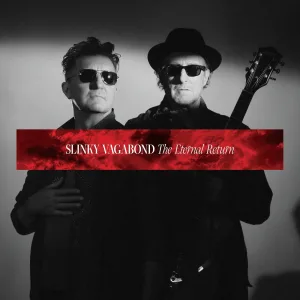 Could you please give us some very basic information about the writing and recording process of “The Eternal Return” album?
Could you please give us some very basic information about the writing and recording process of “The Eternal Return” album?
Sure, yeah. I worked very closely with my songwriting and production partner, his name is Fabbio Fabbri (guitar) and he has a studio in Florence, Italy, so, we do most of the recording there. We started probably in 2021 writing these new tracks and we recorded most of the instrumentation there and then we actually recorded the drums in Brooklyn, New York, in a studio called Mission Sound. Then, all of our collaborators, Mike Garson (David Bowie -piano), Ava Cherry, Percy Jones (Brand X, Brian Eno -bass), Dom Beken (Nick Mason’s Saucerful Of Secrets, The Orb -keyboards), they all created their guest pieces in their own studios. So, we then put everything together and Fabbio mixed everything and produced the final tracks in his studio in Florence. That’s basically how we have worked on the last record (ed: “King Boy Vandals” -2021) and on this record.
The piano part of “Ad Astra” is amazing. How did you come up with this idea?
I’ve always loved Mike Garson’s playing and I actually contacted his manager, who is his son-in-law, a guy called Mark Bakalor. I contacted him in 2022 and I asked: “Would Mike be interested in playing on a couple of tracks?” So, we sent him maybe four tracks and he listened to two and he said: “I love ‘Ad Astra’ and ‘Anthem’ and I’d love to play on both. What do you want on ‘Ad Astra’?” and I said: “Well, a kind of discordant and jazzy piano, a lot insane” and that’s exactly what he did (laughs). There is a very famous quote that David Bowie said and that was: “I ‘m always happy, I don’t have to pay Mike Garson by the notes” (laughs), because he plays all the notes on the piano. So, yes, Mike did it and it was perfect, basically, the first take.
“Icarus Falls” is quite electronic. What inspired you to write this?
The way we really work is: Sometimes Fabbio has instrumentation on a basic demo written and then he gives that to me and then I write the lyric and the topline. Sometimes, I have a completed demo with lyrics, music and everything done and Fabbio has a completed demo. He doesn’t really write lyrics, he usually sings a melody and then we will exchange his ideas, but for “Icarus Falls” he had the music written, I had lyrics already written and they just went together very seamlessly. It’s literally about the story of Icarus, reaching up too high and falling down. The lyrics are quite abstract and they also relate a little bit to a very famous surrealist painting called “Landscape with the Fall of Icarus” (c.1560) by Peter Bruegel the Elder and it was kind of inspired by the weirdness of this surrealist painting, as well. So, yeah, those two elements and it really came together very well. Then, we had a remix done by a British duo called Cult with No Name, so there is a rock version of “Icarus Falls”, which is on the album and there is a separate electronic and piano piece where Cult with No Name basically took away all of the backing, kept the vocal line and wrote a new backing for. I love those guys, they are a duo, they are based in London and I love their work. They are great players and great performers.
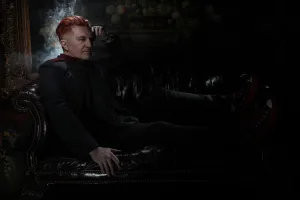
What is the meaning of “Anthem” from “The Eternal Return” album?
It’s very interesting because I write lyrics in a very-very abstract way and I try to make them not really so much literal. “Anthem” is really about mortality and the words were written after visiting Kiev in Ukraine in 2021. I went there to see a creative week of fashion and art and I saw so many young people with so many creative ideas and I came back to New York and I was very inspired by them. Then, obviously Ukraine was invaded and I was thinking about those creative people who made a very special environment in Kiev, how it suddenly was a war situation. So, I was really thinking about mortality and I was also thinking about my own mortality, too, because I turned 60 years old this year. When you get to 60 it’s like: “Wow!” (laughs) It’s a big number. When you are young, you don’t think about death, but when you get to 60 you start thinking: “Ok, that’s coming at some point. Hopefully, not too soon, but it’s coming”. So, that’s really what “Anthem” was about. It was about those two ideas: The inspiration of being in Kiev and then thinking of my own mortality.
“Perfect World” is a very addictive song. Please tell us everything we should know about this great song.
“Perfect World” was co-written with Glen Matlock from Sex Pistols (bass) and Glen and I had the original version of this band, Slinky Vagabond. It was Glen, Earl Slick (ed: David Bowie, John Lennon -guitar) and Clem Burke (drums) from Blondie. We formed that band in 2007 and we are great friends. Glen had this music written and we demoed it in his house, he has a small studio in his house. So, we demoed this probably 15 years ago, so, it’s an old song and I was really thinking about materiality. We are in a very material world where we are consuming all the time. We are consuming the new iPhone, whatever that is, the latest iPhone, or the latest technology or the latest clothes or whatever and in “Perfect World” I was really thinking about that: Somebody thinks they are gonna be living in the perfect world when they have all these things and this is something I think that is a modern disease. We are measuring our lives by what we consume, so, that is really where that idea came from. Glen wrote this and it has a blues feeling. I love the song, it’s a great song and I’ve always wanted to record it properly, so, Glen gave me his blessing when we went to do the new version of that.
There are many great special guests on the album such as Ava Cherry (vocals), Glen Matlock (Sex Pistols -bass), Mike Garson (David Bowie -piano), Percy Jones (Brand X, Brian Eno -bass), Earl Slick (David Bowie, John Lennon -guitar) and Dom Beken (Nick Mason’s Saucerful Of Secrets, The Orb -keyboards). What did they add to it?
They add colour. Fabbio and I work together very-very well as a songwriting, recording and performing team but we want this project to have the feel of a band. So, it’s important to have other players bring in their magic dust that they sprinkle on everything, whether it’s Mike with his amazing piano playing and also Dom Beken who plays with Nick Mason (drums) from Pink Floyd. Dom is a great piano player too and a great synthesizer player. Percy is my bassist idol. He is a great musician and a great person. He lives in New York, he lives Uptown, not so far from me and I’ve always loved his playing. When I was a kid I really loved the band Japan and they had a bass player called Mick Karn who played fretless bass. So, when I was a kid I thought Mick Karn invented fretless bass and then years later I found out it was Jaco Pastorius and Percy Jones, there were other players. So, I’ve always wanted to work with Percy and it’s great to get him on a track. You could almost take away all the other instruments and have Percy. He’s like Mike, he plays all the notes, all the time (laughs). Glen Matlock and Earl Slick, we had two songs that we co-wrote together. Not only are they playing on the album, the guests also bring their co-writing aspect, too. So, I think that gives it a nice variety.
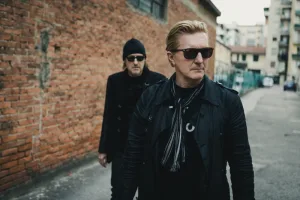 What was the musical vision you had when you formed Slinky Vagabond?
What was the musical vision you had when you formed Slinky Vagabond?
When we first formed with Glen, Clem and Slick, it was an accident. I met Earl Slick through MySpace and we got together in New York and he said to me: “Oh, if you want to record some of your songs, let’s do it”. I knew Glen Matlock and I knew Clem and we needed a rhythm section, so, I called those guys and they said: “Sure, yeah, we’ll join” and that was almost accidental. When we created the new version with Fabbio and I, it was because Glen and I were giving a lecture in Italy and Fabbio came to the lecture and afterwards he start chatting with the two of us and Fabbio and I became great friends. So, it was a second accident. The second version of Slinky Vagabond was also accidental. There really wasn’t a vision. The vision was to make some music and have some fun and it developed on from there. This is our second album in this new format and we are doing it for the fun and love of it, more than anything else. That’s really the vision: To enjoy ourselves and express ourselves.
What memories do you have from the first Slinky Vagabond show at the Joey Ramone birthday bash in 2007?
It was fantastic. It was a fantastic show. We supported The New York Dolls, so, there can’t be a better start than that. When I was a kid The New York Dolls were my idols along with Sex Pistols and Bowie and other bands, so, to open for them was amazing. I remember it was a big venue, the Irving Plaza is a big venue, it upholds maybe 1.000-1.500 people and that was my first show with that band, at that moment and I hadn’t been on stage for several years, so, I just felt not scared, but very high energy. The audience were fantastic and they really were interested to hear this new band and there is nothing better than being on stage and you look to your right and it’s Earl Slick and you look to your left and it’s Glen Matlock and then behind you it’s Clem thundering away, it lifts you up so much. We did several shows, we played in Central Park, we played at Mercury Lounge which is a great venue in New York and each time the audience were really with us. So, they were great memories, it was really exciting.
Is your meeting with Fabio Fabbri (guitar) in 2017 a turning point in your musical career?
Oh definitely, yeah, I think for both Fabbio and I. We were at a moment where we were ready to do another project. Fabbio had a guitar blues rock band that he’d been touring with for many years before then and he was looking for something new and I was very interested to, first of all, just go to his studio. We just jammed around and tried out some ideas and what we realized was we had a good chemistry together. What he brings to it, are skills that I don’t have; what I bring to it are skills complementary to what Fabbio does, but the basis of it is we just became really great friends and I think that’s the foundation of the band. Fabbio and I, we are great friends, we trust each other and we trust each other’s vision, as well.
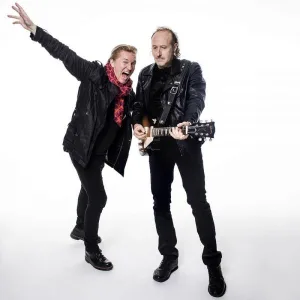 How much has your approach to songwriting changed over the years?
How much has your approach to songwriting changed over the years?
It changed significantly in the ‘90s because of Logic Audio. Before that I was recording on tape, not always live. In the ‘80s, I was doing a lot of electronic music, so, that was recorded track-by-track, but also before that I had been in a punk band, I was in an electronic New Romantic band and we recorded live as a band. In the ‘90s, with the advent of digital recording, it really changed and having Logic Audio, being able to have a studio in your home, meant that you could actually waste a lot of time (laughs), frankly, by doing things over and over again. So, I think digital recording was a good thing, but it changed the aspect of songwriting, because you could do the cut and paste very-very quickly. But having all those options sometimes it’s just too much and you spend a long time playing and not finishing something, so, I actually like to go into the studio with a clock ticking and record. I like to have songs written before we go into the studio; I don’t want to go in and write in the studio. I want to have everything demoed very clearly, so, we go in and just do it.
Martin Turner (Wishbone Ash -bass, vocals) was your producer in the ‘80s. Why did you decide to ask him to play bass on “King Boy Vandals” (2021) album?
I love Martin, he’s a great guy. He’s a fantastic bass player, he is a great singer. I would have him sing on it too, if he had the time. Martin was my producer in the ‘80s as you said and we ‘ve always stayed in touch; I love him, he is a great person and I really admire him as a musician. Wishbone Ash, with those twin guitar, they were really the foundation of that. I mean, there are other bands that had twin guitars, but Wishbone were one of the first and really created that amazing sound. But also Martin was the heart and soul, you know, his bass playing and singing and he is just really funny, as well. He’s a great producer and he keeps things very light, he has a great sense of humour, I just love him. So, we really wanted to have him involved on “King Boy Vandals”. I would have asked him again this time but I don’t think he has the time at the moment, he’s busy. After Covid everybody is suddenly on the road touring as much as possible (laughs).
Does your work as fashion designer distract you from creating more music?
Not really, no. I mean, from time point of view, yes, it takes a lot of time. But also the inspiration of both sides of my work inspires the other. If I’m doing something in fashion, that inspiration bleeds over into the music and vice versa. The thing is I don’t really like fashion, I like style. Fashion is what people follow, but musicians always have great style and it’s not necessarily what the world is wearing, but they are iconic. Making a living has always been in fashion, but music is my love and I think both sides really inspire the other.
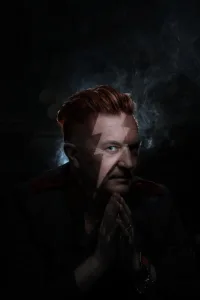
You created a limited edition fashion collection inspired by David Bowie in 2007. How did you get to know David Bowie?
David had a business manager called Bill Zysblat who owns the RZO (Rascoff Zysblat Organization) and he’s managed David’s affairs since “Serious Moonlight” (1983) era, so, I contacted Bill probably in 2004 and I was interested in doing merchandise for David’s tours, but actually at the end of 2004 David stopped touring. So, the conversation with Bill was initially very positive and then nothing was gonna happen with this touring, he retired from touring. A few years later, I already had a deal with this big retailer in the US called Target, so, I went back to Bill and said: “Look, do you think David might be interested in doing a limited edition collection for Target? The volume would be really big, it would be a lot of clothes, so, financially it would worth its while”. So, Bill organised a meeting with David and we went uptown to Bill’s offices and we had that initial meeting. I pitched that idea to David and he liked it and he gave me his blessing and then we moved step by step. David gave the approval like the design director for the whole project. So, I would make designs, I would show them to David and he would say: “Yeah, I like that”, “no, I don’t like that”, “can you do more of this?” and that happened over about a 9-month period. It was always very exciting getting a phone call on my phone that says: “David Bowie”. Actually, I had his real name in that, David Jones, so, the caller was David Jones (laughs).
David Bowie declined to perform a song at the launch party of your collection saying: “I’m not Posh Spice”. What were your thoughts when you heard this phrase by him?
He was very kind and funny and a genuinely positive person, but also he could be very cutting, to the point and that was one of those moments. The retailer that we were launching the collection with, asked me to ask David if he would do a song, so, I had to ask David because I couldn’t not ask him; if later he found out that: “Oh, they wanted me to do a song”, maybe he would have said “yes”. I knew he didn’t want to do it because at that point he was not performing. So, I had to ask him and I said: “Don’t shoot the messenger. I’m just the messenger. This is what they are asking” and he said: “No, I’m not Posh Spice”. Basically, he didn’t want to appear to be overtly commercial by going into the fashion and try to sell it. He just wanted to be the inspiration and to step back from it and allow it to happen the way that it happened. So, I respected his point of view and his decision, but yeah, it was funny at the time. It was funny and a little bit scary (laughs).
Who are your influences as a musician?
They are very wide. I mean, the first version of Slinky Vagabond, those guys that I was in the band with, were really some of my influences: It was Bowie, Sex Pistols, Blondie. Blondie were representing the new wave of music. Blondie have “Rapture” (1980), it was a big disco hit, they have “Rip Her to Shreds” (1976), which is more new wave, they have “The Tide Is High” (1980), which has more of a reggae vibe. Glen had his Sex Pistols side, but also his influences, Small Faces and bands like The Who, for example, so, all of those influences were really my influences. I was very lucky as a kid to grow up and have all those influences and then to get to work with these guys that I really admired and they treated me as an equal, but I was always in awe of them. I was like: “Oh, Slicky” (ed: Earl Slick). If Earl Slick plays guitar and says to me: “Does that sound ok?” I am like: “Of course, it sounds ok. You are Earl Slick! Whatever you do is ok” (laughs).
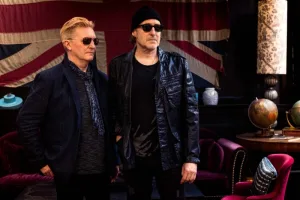 How different is the music scene of New York than the London one?
How different is the music scene of New York than the London one?
It’s become very different in the last decade and this is happening in London, too. The small venues that were in Manhattan have pretty much gone away; there are still a few like Bowery Electric which is Jesse Malin’s venue on the Bowery, but many of the small venues because of the cost of real estate going up, they have disappeared. There are still great venues in Queens and Brooklyn like TV Eye, for example, for small bands to get started, but it’s really difficult. I think London still has more venues and it has some of the iconic ones like The 100 Club that still exists and it has a lot of live music venues in Shoreditch and so on. So, I think right now there is more of a scene in London; New York is very difficult. We have very good friends in a band called The Ritualists and the leader of that band, his name is Christian Dryden, he is a great multi-instrumentalist and he actually played drums on our record, “The Eternal Return”, he played drums on every track and his band I think it’s one of the bands that they are gonna break through. They had Ed Buller (Suede, Pulp) produce their first album (ed: “Baroque and Bleeding” -2022), they are working with Mario McNulty (ed: David Bowie, Prince producer) on their second album and they are a young band and they are very exciting. So, hopefully they will break through, but I think it’s a little bit more challenging. The scene of The Strokes, Yeah Yeah Yeahs and LCD Soundsystem that was in New York in the early 2000s, there isn’t really that scene today, unfortunately, because there just aren’t the venues.
How challenging is it for you to teach at the University of Southern California’s Iovine and Young Academy, founded by Jimmy Iovine and Dr. Dre?
It’s actually a delight to work with that university, it’s not challenging at all. I teach several classes that cover entrepreneurship for fashion, so, if you wanna start a business that covers sustainability and fashion and if you wanna create a fashion line that has a positive effect on the planet. Then, I also teach an introductory fashion course and I try to weave in as much as possible aspects of music, because fashion and music have run in parallel. I was watching the “Beatles ‘64” documentary last night and if you think of The Beatles suits, they were very influenced by the designer Pierre Cardin. It that documentary, as well, Ringo (ed: Starr -drums) is looking at old clothes from The Beatles era and he is looking at clothes made by stores like Granny Takes a Trip, which is a very famous ‘60s boutique or Hung On You, which actually was a store that is in the venue that Vivienne Westwood store is now in, 430 King’s Road. I think fashion and music always have these parallels and it’s actually interesting to look at how, for example, hip hop has influenced fashion from the ‘90s in a tremendous way, how electronic dance music has impacted on the fashion industry and then go back and look at ‘70s fashion like the punk movement or the early ‘70s like Rolling Stones’ “Exile on Main St.” (1972). You could see parallels between that and the way Primal Scream dress now and did in the ‘90s. So, there are a lot parallels. I find it very easy to teach and the great thing about Iovine and Young, the bedrock of it, is performance and music. Jimmy has discovered so many great artists, Dre is such an iconic performer, so, there is a good synergy between the two. It’s a thrill to do it.
You got to know many great artists. Who is the nicest person you have ever met?
David Bowie (laughs). Famous people are really good at making it feel like it’s not weird that you are in a room with them and the more famous they are, the better they are at doing that. They make it feel like: “Am I in a room with David Bowie?!” but it doesn’t feel weird because he acts like he is a regular guy, he is David Jones. Or Earl Slick or Glen Matlock. Glen doesn’t act like: “I am one of The Sex Pistols, you have to bow down to me”. Glen is just like a regular guy. I’ll tell you the worst one: It’s Johnny Rotten (ed: John Lydon -Sex Pistols, PiL -vocals). By far. John Lydon lives up to his Rotten name (laughs).
Why?
He is not a nice guy. He is very good at being Johnny Rotten, which is brilliant on stage but in real life is not so good. It’s good when you are 21, but it’s not good when you are 68 (laughs).
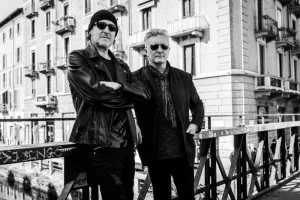 What’s so special about the orange RCA label?
What’s so special about the orange RCA label?
When I was a little kid I was listening to probably the first music that I love, which was all of glam rock, but it wasn’t really Bowie or Roxy Music. Everybody says Bowie or Roxy Music, but when you are like 9-10 years old, it’s the more bubblegum stuff and I loved The Sweet. When they were playing “Block Buster!” (1973), which is the same riff as “Jean Genie” (ed: David Bowie -released as a single in November 1972), which is the same riff as “I’m the Man” by The Yardbirds (ed: written by Bo Diddley), which comes from blues, I didn’t know that; I thought The Sweet had created that (laughs). And they were signed to RCA, they were on that orange label and of course then Bowie was on the same label and Elvis is on the same label. See, you’ve got all of these iconic artists and I think now Duran Duran are signed to RCA and they are able to have that orange label, which Nick Rhodes (ed: keyboards) said it was a dream come true for him. There is something magical about these ‘70s orange. It’s great.
I used to read that the only rule in punk rock is that there are no rules. But, I read a Stewart Copeland (The Police -drums) interview last year and he said that actually the rules of punk rock were extremely strict: You shouldn’t write a song about love, you shouldn’t have a guitar solo, you shouldn’t write a song over 3 minutes, you shouldn’t wear bell-bottoms, you should only write about being pissed off, you should have short hair. What’s your opinion about this?
I think as soon as the rules were written down in punk, punk was over because actually, originally, there were no rules. I would see a band like Suicide for example who supported The Clash and Suicide were one guy who looked like he was from a street gang in New York with a knife on stage, he was running around with his flick knife, Alan Vega (vocals), amazing! And then, Martin Rev on this weird synthesizer with a drum machine booming in the background and I saw them with The Clash. The audience wanted the traditional punk band with four people playing guitar and drums and they were throwing beer and all sorts of stuff at Suicide. I thought Suicide were brilliant because they were truly punk, they did not follow the rules. So, I think Stewart is right, there were rules but what was great about Police is they didn’t follow those rules: They wrote great melodies, he is a powerhouse, amazing drummer, I love his drumming, they made this 3-piece as well, power trio basically, that was also not in the rules of punk, you had to have four people, you had to have a singer, a guitar player, a drummer and a bass player. Stewart is right, but as soon as the rules came in, I think punk was over, which is why I moved on and a lot of other young kids moved on and started listening to bands like Joy Division and other bands that were more creative.
Some people say rock ‘n’ rock was built on mythology. Nowadays artists post backstage photos etc on social media, so, their no mystique at all. Do you agree with this?
Unfortunately, I do agree because I didn’t want to know what Mick Jagger was having for breakfast (laughs). I want it to be almost my ideal of what a rock star is and what a rock star does. I think today we are in a very different landscape with social media. Artists today give away everything and it’s very difficult to have a long term career. If I was a young artist starting out, I would be afraid because having a long term career is really challenging now. If you give everything away in the beginning, what else is there to entice the audience? You just give them everything. But it’s the new normal for the music industry and anybody who wants to be a superstar they feel that they have to play that game with social media. I think everybody plays into; I play into, too. I am criticising it but everybody does it. Unfortunately, it is what it is.
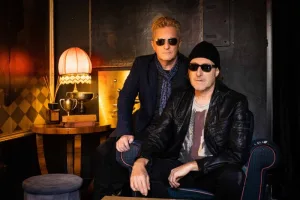 By the way, one of my heroes and one of David Bowie’s heroes was Scott Walker, who didn’t play that game.
By the way, one of my heroes and one of David Bowie’s heroes was Scott Walker, who didn’t play that game.
I mean, today -obviously not a new artist, but- David Sylvian (ed: Japan -vocals, guitars, keyboards) who is very much influenced by Scott Walker, he also maintains that mystique and it’s great. Bowie was doing that at the end, too. For 10 years he didn’t do any press, he didn’t do really many songs, he definitely did a handful of live performances, so, I think he regained a lot of mystique in the end. I wish he was still with us.
David Bowie hated repeating himself. He would adopt a persona, later abandon it and never looked back. Is this the best way of moving forward?
Well, the opposite of that was The Ramones. The Ramones always had leather jackets. The template can be: “You change all the time” or “You remain absolutely the same”. You play the same riffs, you play the same tempo, you figure out a way to make it new again. So, I think there is the yin and yang of the rock star. Then, you have newer people, I guess, Lady Gaga is an example. Maybe Billie Eilish is an example, although she hasn’t been around long enough really to make that evolutionary step. Bowie came from a very different era and I do believe that the golden age of rock, ‘60s and ‘70s, I don’t think we will see those kinds of stars again, unfortunately. Nick Cave is another example as somebody who evolves but he stays within a certain perimeter and his audience wants that. Starting with The Birthday Party was very-very different to the original Nick Cave and the Bad Seeds, but since the Bad Seeds he had a very similar trajectory with his albums, his music and certainly his look. So, I don’t think Bowie really planned that, to be honest you with. I think he tried a lot of things, eventually, it worked with Ziggy (ed: “Ziggy Stardust” -1972) and then he became this chameleon.
I ‘ve read that he studied with the great mime Marcel Marceau, so he viewed art as an imitation.
Yeah. Earl Slick always says to me that he thought David was a really great actor. His name is David Jones and David Jones’ best role was David Bowie, so, he was playing this rock star all the time. The times when I met David, he was dressed in very ordinary clothes, he didn’t project any kind of aura of being a rock star, he was very “normal” and I think that was because he was David Jones, on those occasions. He didn’t feel that he had to be Bowie. So, I do think he was an amazing actor (laughs).
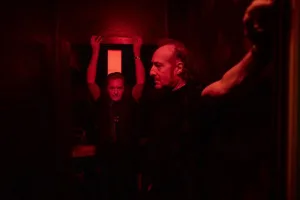 Why do you prefer “The Man Who Fell to Earth” and “The Thin White Duke” Bowie era?
Why do you prefer “The Man Who Fell to Earth” and “The Thin White Duke” Bowie era?
“The Man Who Fell to Earth” (1976), I think in that movie, he was playing David Bowie and that’s probably why people think that’s his best role, because he was playing that rock star, still. It wasn’t that different from the way we perceive Bowie as a performer on stage. In creating a fashion collection, I was making a fashion collection for a very big retailer that have 1.400 stores across the whole of the US, so I had to create a collection that would have broad appeal. I couldn’t do glam rock with huge shoulders and sequin jumpsuit and things, it just wouldn’t work. So, “The Man Who Fell to Earth” and “The Thin White Duke” were very understandable to turn into a fashion collection. Personally, the reason why I love “The Man Who Fell to Earth” is because in 1976 I was 12 years old and “The Man Who Fell to Earth” came out in real time for me, it was in the movie theatres in real time. Before that, from “Hunky Dory” (1971) to “The Man Who Sold the World” (1970), even “Ziggy Stardust”, I’ve heard those records after they came out, like probably a year or two after they came out, but “The Man Who Fell to Earth” was real time, it happened in front of me. So, I connected with that very much as a young teenager and like every teenager you feel isolation, you feel like you are outside and all those traits upon that character, so, that’s really why it really resonates with me.
A huge “THANK YOU” to Mr. Keanan Duffty for his time. I should also thank Mr. Ben Pester for his time.
Slinky Vagabond official website: https://www.slinkyvagabond.net/

